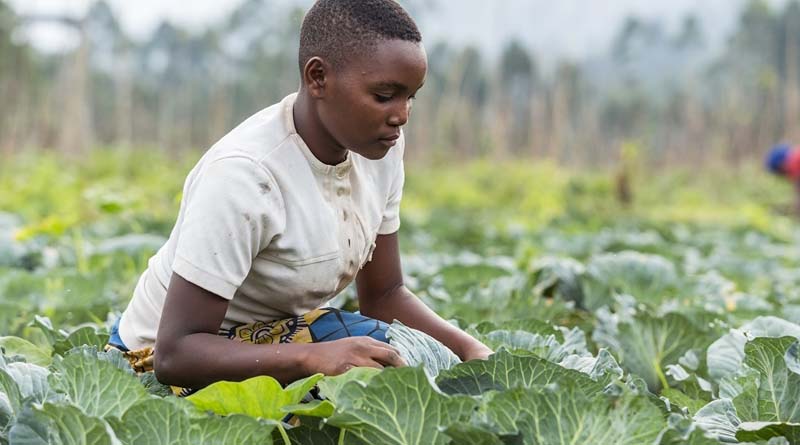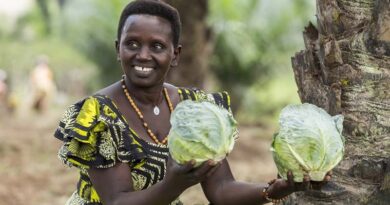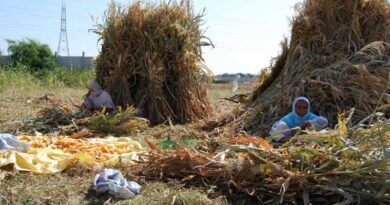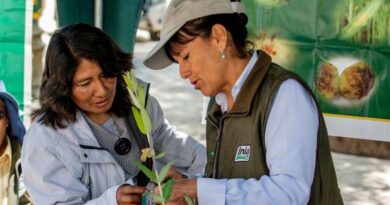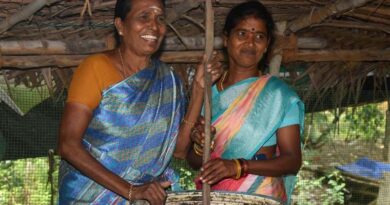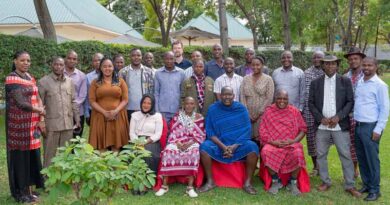Overcoming social norms to boost women farmers’ access to agricultural advisory services
08 March 2024, Africa: On International Women’s Day, we must celebrate women’s progress in agriculture. Women are embracing agricultural services and training. They are empowering themselves and becoming skilled farmers in their own right, writes Sandra Phelps, Gender Manager, CABI.
However, we must also address the barriers that so many women farmers continue to face. The FAO estimates that women make up 43% of the global agricultural labour force. Yet despite the high numbers of women working in agriculture, women lack access to and control over resources. This includes everything from credit, inputs and land to knowledge and information. As a result, they produce 20-30% smaller crop yields than men.
This inequality is not just bad for women. It is bad for everyone, affecting global food security. If male-female differences in access and yields were overcome, the number of hungry and undernourished people would fall by 100-150 million worldwide.
One core impediment to women’s empowerment in agriculture is their lack of access to agricultural advisory services. Extension offers a lifeline to smallholder farmers. And this is especially true for women, who may have had fewer education and learning opportunities than men. Extension can help women to overcome plant health challenges. This leads to better crop yields, safeguarding food security and income. However, women only receive about 5% of the agricultural advisory services and training available. Why is this and how can it be overcome?
Re-framing and unpicking complex gender challenges
Gender equality is one of the five core pillars of CABI’s Medium-Term Strategy for 2023 to 2025. We use our understanding of gender, social relations and underlying power dynamics to improve the participation of women in agriculture. Female smallholders experience many different types of inequality when it comes to accessing agricultural extension. However, the problems we see on the surface are often born out of much deeper challenges.
Take, for example, women’s attendance of agricultural training and workshops. Extension providers sometimes raise criticisms of women’s apparent lack of interest in participating. But when we look at the underlying problems, it is often not a lack of desire that stops their attendance; it is a lack of opportunity. Women cannot easily leave their children at home. They cannot travel to the places where training is being held. They might lack the necessary reading skills for the training.
Criteria like mobility and literacy can inadvertently deselect women from agricultural advisory opportunities, meaning they miss out. So, we must re-frame the selection criteria and use processes that foster gender equality. The good news is that projects delivered in accessible and targeted ways help women excel in agricultural training.
PlantwisePlus – reaching and empowering more women farmers
Take the work of the CABI-led PlantwisePlus programme. Ghana is one of the programme’s focus countries. Here, women farmers face significant challenges in accessing services that would elevate their farming activities. Often available services are designed for and targeted at male farmers. As such, PlantwisePlus aims to enhance awareness around, and reduce, gender inequities within the rural advisory sector.
A PlantwisePlus behaviour change communication campaign in Ghana is focused on changing attitudes toward women’s access to agricultural extension. The interventions included community dialogues, Community Information Centre (CIC) broadcasts of recorded radio programmes and training in Gender and Rural Advisory Services (GRAS). It also used an interactive radio campaign to reach women farmers.
The programme has been fostering change since 2020, and results are starting to manifest.
A 2022-23 assessment found that around 85% of the agricultural extension agents involved in the programme increased the number of women farmers they were in contact with following step-down GRAS training. And 44% ‘strongly agreed’ that the training had led to attitude and behaviour changes. Furthermore, all but one agent said their knowledge on gender inclusivity had developed to become ‘good’ or ‘very good’.
PlantwisePlus is also working to grow the number of female plant doctors. It is critical to employ more women in agricultural advisory services in order to achieve gender equality and food security more generally. Seeing women in leadership roles helps women to feel empowered. Role models embody and inspire confidence. They help women overcome the unspoken rules – or social norms – that keep them from achieving their potential as farmers.
The influence of social norms – the root of the challenge
Women’s inclusion in agricultural advisory services and training is essential, but social norms can stubbornly stand in the way of their participation. For example, women might receive training in pest management, but not be able to implement it because they cannot travel to market to buy pest control products. Laws might enable women to own land, but community attitudes and behaviour make them defer that ownership to their husbands.
Customs and social norms often hold great weight. The Swedish International Development Cooperation Agency, Sida, states that, “Customary systems of property tenure account for at least 75% of the land in most African countries.” These powerful rules of conduct are formed and collectively enforced by a group. They dictate socially acceptable behaviour, but they can also limit the potential of certain sub-groups. Social norms are often at the core of why women cannot access agricultural advisory services.
When social norms are addressed, agricultural advisory services and training can really deliver. That is to say, when change is addressed at a fundamental level (e.g. a community embraces a women’s right to own land), change in other areas of life becomes possible (e.g. a woman is able to attend agricultural training).
Bringing men into gender equality discussions
Gender equality must not focus solely on women. To concretely address social norms, we must include men in the process. This is because social norms hold men in specific roles just as much as they hold women. And for change to happen, both must be included. By bringing men into the discussion, experiences can be shared. This nurtures better understanding and the breaking down of detrimental stereotypes. An inclusive approach challenges biases, fosters collaboration and helps communities move to address societal challenges, including social norms.
The PlantwisePlus work in Ghana illustrates this point. The programme has been championing gender dialogues in Ghana’s advisory services. Men and women kept a record of their daily activities in a calendar. When they shared the results of these ‘daily calendars’, the men were shocked to learn how much unpaid work women do. The women’s average was five hours a day, while the men’s was minutes. Dialogue like this helps men and women understand challenges and inequalities around care work and household labour – a key barrier to women’s access to extension services.
Moving towards ‘gender transformative’
Changing social norms is a long, multigenerational process, but it is necessary. For women’s empowerment in agriculture to advance further, social norms must be addressed, transforming foundations. We must celebrate the many advances that women farmers are making today. But we must also continue to focus on empowerment at a fundamental level.
Social inclusion is important for sustainable futures. It fosters diversity and equality, building a cohesive society for long-term stability. Ongoing research is vital. A recent paper outlines, for example, business models for engaging women and young people in agricultural service provision in Africa. These models can contribute to economic empowerment. Through inclusion, we can shift the social norms that underpin inequalities. Over time, we will see an increasing number of women empowered to access and uptake agricultural services, benefitting all.
Also Read: Coromandel’s Gromor Drive Crosses 16,000+ acres of Drone-led Spraying
(For Latest Agriculture News & Updates, follow Krishak Jagat on Google News)

